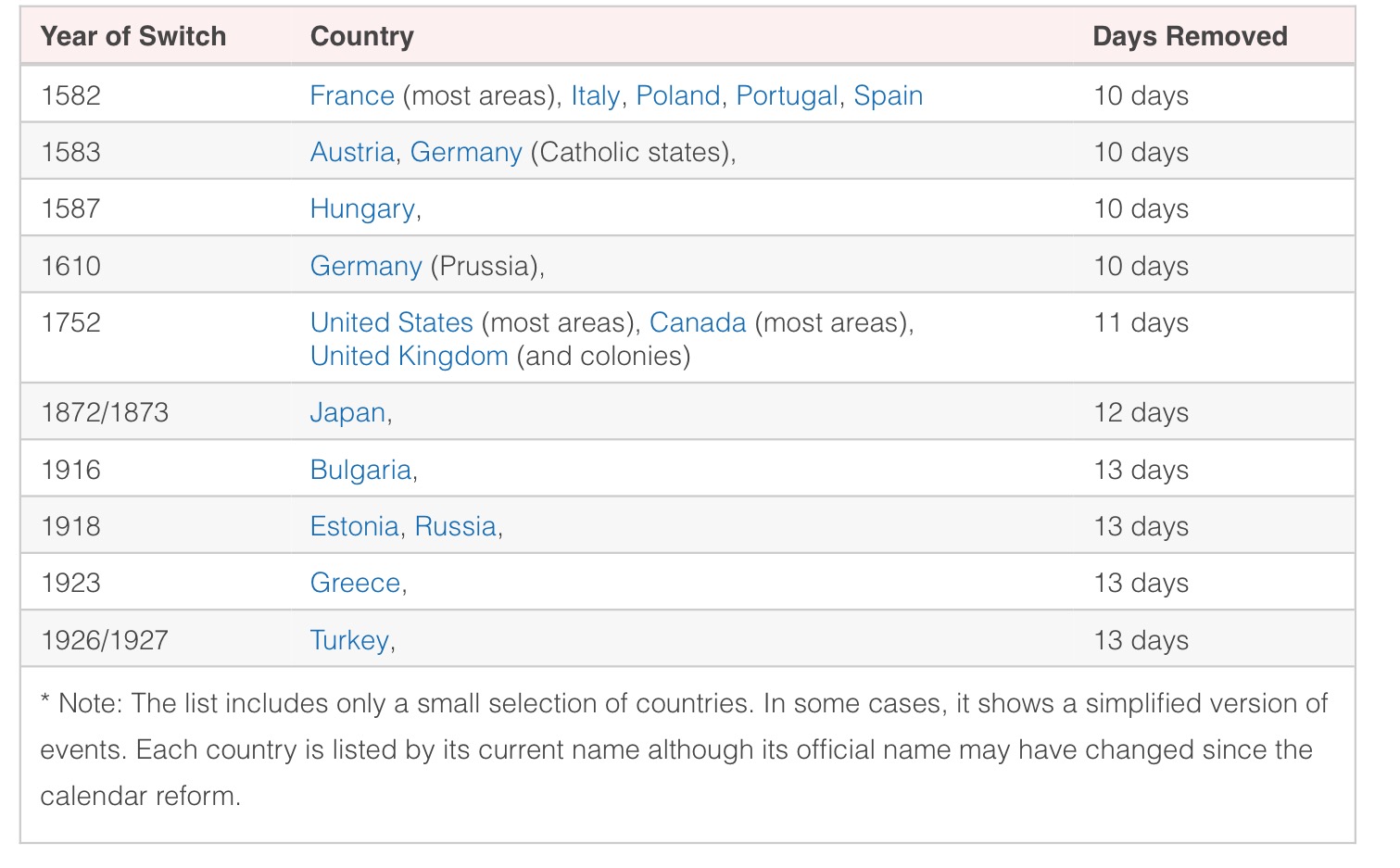Dutchman, I have no idea when we will officially adopt the metric system, but I know it is taught in school today (I know it wasn't taught to great extent in the 70's and 80's, but our military uses the SI system almost exclusively (when giving info to the public they still use the inches/feet/yard/miles). But I agree with you we need to make it official. But that very fact is at the center of my disagreement with you about card blanch use of when the Gregorian Calendar was adopted.
Yes, the Pope Gregory XIII did introduce the calendar 15 October, 1582, but only 4 countries started using it then, and one more the next year. Then there as a long gap before Britain and the colonies adopted it, and then another long period of time before it was next adopted.
Not only did its use not happen all at the same time, not everyone added 10 days. Some added more to it, because they needed to account for the fact that they used that many more leap year day(s) that were not in the Gregorian Calendar.
Maybe error should be explained better by me, which I thought I didi. Your program and now my formula works, but if not used correctly will produce erroneous results, as I proved in my prior post. Your program got the day of week right, but only if the US started to use the calendar on 10/15/1582. It is only when used improperly (without considering the facts below) will it produce wrong results.
Like saying that in the US, 2 September 1752, your program said it was a Saturday, when in fact it was a Wednesday (last day we used the Julian Calendar). If we adopted the calendar as soon as it came out, your program calculates correctly. But my use of it produced an error because of when the calendar was adopted. In fact, because of when it was adopted, any country not adopting it on 10/15/1752, your program cannot be used until the calendar is adopted. When I put 9/14/1752 into Calendar.sb, it comes up with the right day of the week now, but it's the first day of the Gregorian Calendar as far as we are concerned, not the 62,062nd day.
I just think that we can't just provide a generalized statememts without providing details, like I did when Henko helped in finishing the formula. People need to know when the program can or can't be used.
So here is a simplified chart showing the period of 300+ years where everyone didn't start using the calendar on 10/15/1582.

- IMG_0061.JPG (203.49 KiB) Viewed 9501 times
Let's read what this site (
https://www.timeanddate.com/calendar/ju ... witch.html) had to say:
Switch Took More Than 300 Years
The Gregorian Calendar was first introduced in 1582 in some European countries (*). However, many countries used the Julian Calendar much longer. Turkey was the last country to officially switch to the new system on January 1, 1927.
The delay in switching meant that different countries not only followed different calendars for a number of years but also had different rules to calculate whether a year was a leap year.
This explains why the years 1700, 1800, and 1900 were leap years in countries still using the Julian calendar (e.g. Greece), while in countries that had adopted the Gregorian calendar (e.g. Germany), these years were common years.
Sweden and Finland had a "double" leap year in 1712. Two days were added to February, creating February 30, 1712. This was done because the Leap Year in 1700 was dropped and Sweden's calendar was not synchronized with any other calendar. By adding an extra day in 1712, they were back on the Julian calendar. Both countries introduced the Gregorian calendar in 1753.
Our tools are only good when we take into account real life. And if not careful and used improperly, our used when it does not apply, without this added info, how will you know the results are correct?
————————————————————————
George McGinn (@GJMcGinn — Twitter)
Computer Scientist/Cosmologist/Writer
Member: IEEE, IEEE Computer Society, IEEE Sensors Council
Scientific and Mathematical consultant & reviewer of the peer paper and the book "Flying Through The Year 200 000" (available on Kobo)
Dutchman wrote: ↑Mon Feb 05, 2018 6:48 pm
GeorgeMcGinn wrote: ↑Mon Feb 05, 2018 9:40 am
Dutchman, I was looking through your code and I found an error, which I do not think will effect the results. The Gregorian Calendar actually starts on Thursday, 14 September 1752 in the United States, not on 15 October 1582.
…
That is not an error. The Gregorian Calendar starts on 15 October 1582.
The USA however have been quite slow to accept the new development.
That is why I also wonder when the SI system will become commonplace in the USA.

Another 150 years?



